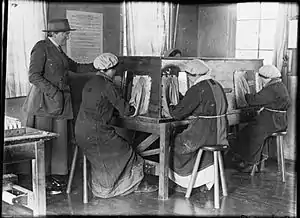Lilian Barker
Dame Lilian Charlotte Barker, DBE, JP (1874–1955) was first British female assistant prison commissioner whose work provided the basis for the modern day humanitarian prison system for female correctional facilities in Great Britain.


Born in Islington, Barker was educated at the local elementary school system and graduated from Whitelands College (Chelsea). As a schoolteacher specializing with delinquent and other troubled children, Barker was appointed principal of the London County Council's Women's Institute correctional facility in 1913. After serving for two years, Barker resigned from her post to join Britain's war effort during World War I, teaching army cooks and as lady superintendent of the Royal Arsenal, Woolwich, overseeing its 30,000 female workers.
Following the war, Barker joined the Ministry of Labour's training department and, in 1923, was appointed governor of the Borstal Institution for Girls at Aylesbury. Under her administration, Barker made sweeping reforms under a model humane reformatory focusing on education, guidance and rehabilitation. By the time of her appointment of assistant commissioner of prisons in 1935, Barker would work to reform women's prisons throughout England, Wales and Scotland based on her work at Aylesbury until her death in 1955.
Barker lived with her partner Florence Francis for 40 years until the end of their lives.[1]
Damehood
Barker was named a Dame Commander of the Order of the British Empire (DBE) in 1944 for her "services in connection with the welfare of women and girls".
Further reading
- Hartley, Cathy and Susan Leckey. Historical Dictionary of British Women. London: Europa Publications Limited, 2003. ISBN 1-85743-228-2
References
- "Women's Employment | Historic England". historicengland.org.uk. Retrieved 22 October 2020.
- Phillips, Charles and Alan Axelrod. Cops, Crooks, and Criminologists: An International Biographical Dictionary of Law Enforcement, Updated Edition. New York: Checkmark Books, 2000. ISBN 0-8160-3016-2
External links
- Biography of Dame Lilian Barker, DBE, andrejkoymasky.com; accessed 24 June 2014.
- Portraits of Lilian Barker at the National Portrait Gallery, London

- Print made by Francis Ernest Jackson at the British Museum